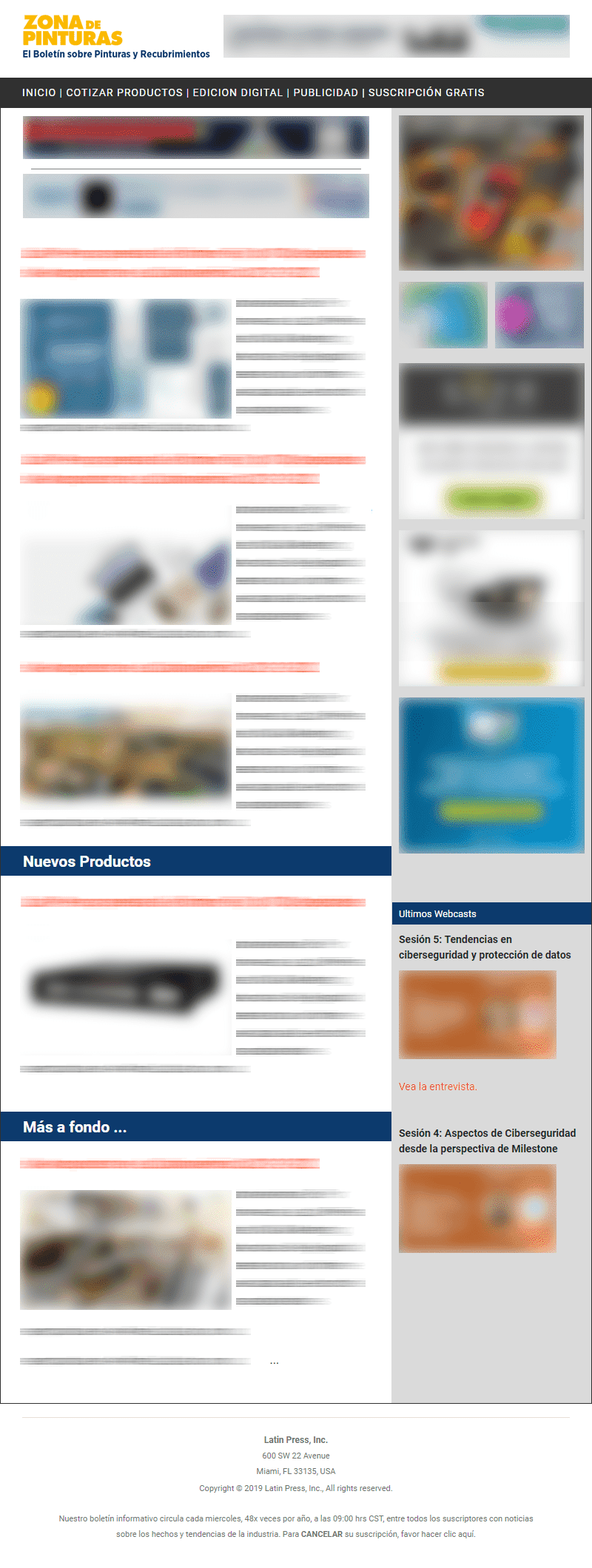Below  we will develop some alternative concepts for the development of coatings under the reference of the "Slow Movement".
we will develop some alternative concepts for the development of coatings under the reference of the "Slow Movement".
by M.Sc. Ph.D. Julián A. Restrepo R.*
Introduction: The ground speed record was achieved in 1997 by the Thrust SSC (SuperSonic Car), which was a mixture of car and fighter jet. Pilot Andy Green reached 1,230 km/h, breaking the sound barrier by setting speed Mach 1.02 [1]. In France there is a train that can travel at a speed of 575 km/h: The Alstom V-150 high-speed train (TGV), which broke the world speed record (conventional wheel and rail train) in 2007 [2]. In Japan, in 2003, a McDonald's launched the campaign "Enjoy! 60 Second Service", in which a hamburger was promised to be served in less than 60 seconds, otherwise the order would be free [3].
In fact, we must recognize that today everything has accelerated: In 50 years we have modified the Earth faster than all the men who have gone before us. Over the past 60 years the planet's population has nearly tripled and more than 2 billion men have gone to cities. The city shenzhen in China, for example, with its hundreds of skyscrapers and its millions of inhabitants, went from being a small fishing village just 40 years ago to a large metropolis and one of the main production centers of the country, in fact it is one of the fastest growing cities in the world [4]. In Shanghai (China), they have built 3,000 towers and skyscrapers in 20 years and hundreds and hundreds more are still being built [5]. When we read news like this, it generates feelings of fascination, admiration and we associate these achievements with efficiency and productivity [6].
However, in this culture where we want everything fast, hurried and now, we must recognize that we get more stress, with the illusion of having more time, maybe we do not taste our food long enough1, we do not cultivate the art of doing things right from the first time, we do not enjoy simple things because of the desire to wait for some to come. In other words, we don't enjoy the journey because we're so focused on getting to our destination, and the result isn't a very happy life... which translates into a regional adage that says: "Of the races there is nothing but fatigue". In this area the point of view of the "Slow" current has emerged [6].
This paper attempts to transfer a philosophical reflection on the applicability of the concepts of the "Slow" current to the prevailing environment of coating design and development, where the environment of the current coating formulator is governed by strict and if you like, short deadlines for obtaining results.
History of the concept "Slow"
It is said that Ferdinand VII of Spain was accompanied by his assistant, moments before attending an important meeting, influenced by the nervousness of wanting to dress the monarch in a hurry, the assistant did not manage to perform his task correctly, so the king snapped at him: "Dress me slowly that I am in a hurry", this phrase being today one more of our usual saying. Actually, this phrase has also been assigned to other historical figures such as Napoleon Bonaparte or Charles III, but what does seem a clear origin of this phrase, at least in its sense, is the command that the Roman Emperor Augustus made to his assistants: "Hurry up slowly". According to Suetonius, a Roman historian, at the time, the emperor advised the following: "Walk slowly if you want to get to a job well done sooner"[8].
But the modern version of the "Slow" movement has its beginning in 1986 in Piazza di Spagna (Rome) and is the result of a certain rebellious attitude on the part of the journalist Carlo Petrini when he stumbled upon the opening of a McDonald's restaurant in this historic enclave of the Italian capital. Petrini considered that the limits of what was acceptable were being crossed and predicted the dangers that loomed over the eating habits of Europeans, bent on imitating the dictates of American culture.
The response was not long in coming, creating the "Slow Food" movement [9]. Thus, against the culture of "Fast Food", the "Slow Food" movement proposes to return to the micro-scale trade of food, to have direct contact with the producer and to have a greater awareness of the origin of what is consumed [10], through the enjoyment of regional products and traditional foods, whose ingredients are often grown in an environmentally friendly way, as well as preserving and supporting traditional ways of life. It also promotes a longer time of enjoyment of these meals in the company of others, at the same time, it tries to defend the diversity of crops and raw materials (MPs) [11].
Thus, although the "Slow" movement emerged in Europe in a food context, defending the art of producing an original, healthy and delicious dish, instead of standardized dishes, emphasizing from its inception the idea that eating does not mean only "filling our gas tank", but rather it is a social experience that should and can be pleasant [12]. Currently the concept "Slow" has been transferred to fashion ("Slow Fashion" and to ordinary life ("Cittaslow", slow cities) [9]. This is how today the movement has several aspects: "Slow living", "Slow parenting", "Slow sex", among others [10].
It is worth mentioning that in turn, 20 years ago, the Czech writer Milan Kundera already warned us that we were going very fast: "Why will the pleasure of slowness have disappeared?" he wondered in one of his novels [13].
The concept of "Slow motion" in brief
The "Slow" movement is a cultural current that promotes the slowing down of human activities: It proposes to take the time necessary to produce something of quality, enjoy the process and adapt to the natural rhythm of the planet. [14].
He also suggests taking control of time, rather than submitting to its tyranny, giving priority to activities that result in the development of people, finding a balance between the use of technology aimed at saving time and taking the time necessary to enjoy simple activities, such as taking a walk or sharing a meal with other people. The speakers of this movement believe that although technology can accelerate work, as well as the production and distribution of food and other human activities, the most important things in life should not be accelerated [11].
At present, since people can do anything at any time, some think they should do things at all hours. The "Slow" movement reacts against it by exalting the values of enjoying and savoring life. Contrary to some trends associated with the term slowness, supporters of the "Slow" movement encourage activity rather than passivity. The focus of this movement, therefore, is on being selective in acting, and on being fully aware of how we invest our time.
For his part, Carl Honoré, author of the book "Praise of slowness", is one of the theorists of this world movement that promotes a calm rhythm even in the most daily activities of the human being. For this Canadian journalist, a quick life is a superficial life, hence slowness has nothing to do with inefficiency, but with balance [9].
In turn, for Carlos Felipe Pardo, director of the Despacio Foundation in Colombia, the name "Slow" or slowly, as it has been introduced in Colombia, can lead to misinterpretations. The idea is not to do everything slowly, but to accompany each activity carried out with a reflection on what is the appropriate speed to do it. If the answer to that concern is that it should go slower, then perfect and if the answer is that you have to go a little faster, then it is also fine. What they preach is not to go on a day-to-day basis simply flowing with a current that does not ask about what it is doing or how it is investing its time, but rather to constantly question why what is done and how it is being done.
Note: In the coming days we will present the second part of this article which will refer to the concept "Slow" in the formulation of coatings.
Footnote: 1. As suggested by a recent study from the University of Iowa (USA), it is recommended that food should be chewed up to 40 times [7].
* M.Sc. Ph.D. Julián A. Restrepo R. Independent Consultant. [email protected] Medellin, Colombia
References
[1] http://www.taringa.net/post/autos-motos/9224808/Records-mundiales-de-maxima-
[2] (a) https://es.wikipedia.org/wiki/Tren_de_alta_velocidad#Francia; b) http://www.taringa.net/post/autos-motos/9224808/Records-mundial-de-maxima-velocidad.html
[3] http://japontotal.com/post/38914408733/mcdonalds-japón-ofrece-hamburguesas-gratis-si-no
speed.html
[4] https://es.wikipedia.org/wiki/Shenzhen
[5] https://www.youtube.com/watch?v=SWRHxh6XepM
[6] http://lamenteesmaravillosa.com/el-movimiento-slow-un-nuevo-enfoque-para-saborear-la-vida/
[7] http://www.muyinteresante.es/curiosidades/preguntas-respuestas/icuantas-veces-es-recomendable-masticar-la-comida
[8] http://siempreconectado.es/origen-visteme-despacio-que-tengo-prisa%C2%B4/
[9] http://www.ecointeligencia.com/2013/03/movimiento-slow/
[10] http://debatesobrepobrezas.uniandes.edu.co/Historial_Gente/166_Gente_slow_19062012.asp?id=166
[11] https://es.wikipedia.org/wiki/Movimiento_lento#Cittaslow
[12] http://debatesobrepobrezas.uniandes.edu.co/Historial_Gente/166_Gente_slow_19062012.asp?id=166
[13] http://bajolamanga.co/index.php/columnas/item/437-suicidio-y-la-necesidad-de-desacelerar-el-paso
[14] http://lamenteesmaravillosa.com/el-movimiento-slow-un-nuevo-enfoque-para-saborear-la-vida/

























Leave your comment